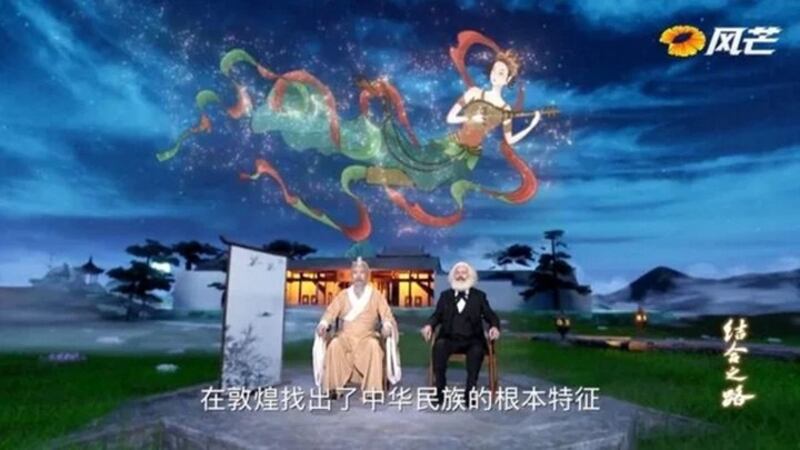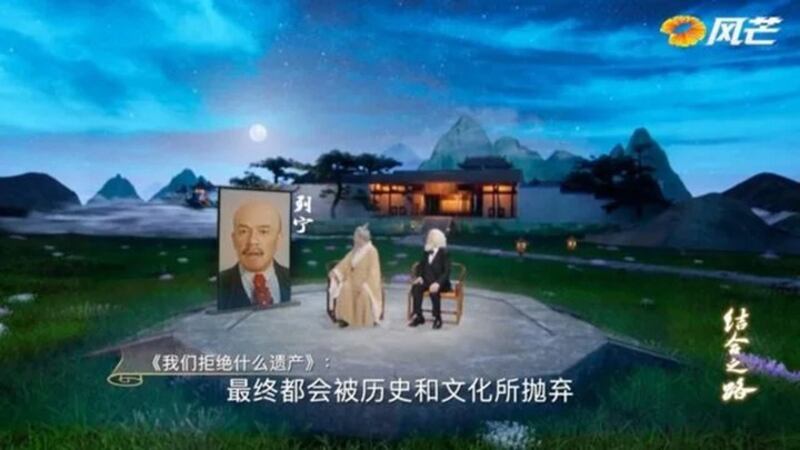Viewers in China are ridiculing a propaganda film showcasing attempts by President Xi Jinping to merge the thought of Karl Marx with that of Confucius, slamming the show on social media as "boring,” too "far out” and counter to the Marxist-Leninist philosophy that the People's Republic of China was founded on.
According to officials, the Hunan Satellite TV show, which comes as Xi steps up a campaign to promote his personal brand of ideology, has been viewed more than 1 billion times.
Based on a short story by late communist author Guo Moruo titled " Marx Enters the Temple of Confucius," it depicts the founding father of communism in conversation with China's most famous sage, taking theoretical questions from students, all interspersed with performances of traditional music, cartoons and rap.
It clearly has the seal of presidential approval, having been screened during a recent propaganda conference in Beijing that was chaired by Xi and marked his attempt to stamp his political ideas on the cultural life of the nation.
But its attempt to meld the two vastly different philosophies – dubbed the "second combination" by Xi – met with very mixed reactions on social media.
"If I remember correctly, those who believed in Marx during those ten years should have smashed everything related to Confucius [Second Combination] #WhenMarxMetConfucius," @Phuket New Forest said in a reference to the 1966-1976 Cultural Revolution.
"They didn't smash it hard enough," commented @Agony丶Cloud.

Others griped about the dialogue, in which Marx says: "I have been in China for more than 100 years. In fact, I have been Chinese for a long time," and says both philosophies "share a commitment to stability."
Confucius agrees, saying that both "hoped to achieve the highest happiness for mankind."
"Who came up with these lines?" one comment wanted to know.
Common enemies
Marx and Confucius also agree that they fought common enemies, including non-approved takes on history and Western attempts to impose "universal values" on China, something Xi has explicitly banned since taking power in 2012.
Computer-generated mythical figures appear to endorse the sage as the true representative of traditional Chinese culture, while Lenin makes an appearance to call for an end to the "feudal" elements of that culture.
They then hail Xi's "second combination" of their philosophies.
"When history happens the first time round, it's often a tragedy, and when it happens again, it's often a comedy," wrote @absolute_zero_9, adding in apparent reference to life under Xi Jinping: "I sincerely hope that this decade-long farce will be over soon!"
@Choice_is_very_important wanted to know if the fictional meeting meant that retail stock market investors will now have to pay for officials to "go to clubs, eat high-end Western food [and] have their feet washed," citing the Confucian respect for authority figures.
Others had a more succinct reaction.
"I feel sick," @Your_Ah_Q_Spiritual_Victory_Method wrote, while @clown_actor_1920 commented: "All I see is oppression."
User @qkeaa described Confucius as "a wandering soul, something only fit for a museum," while @10_hours_of_charging wrote: "#WhenMarxMeetConfucius# made me see how ridiculous contemporary literary and artistic work is."
In a reference to the leader of the doomed Taiping Rebellion, who said he was Jesus' brother and tried to topple the Qing Dynasty, they added: "But I'd still watch 'When Jesus met Hong Xiuquan'."
"I'd rather watch 'In the Night Garden'," @Captive_snail_003 said, of the British TV show for small children. "At least it's not intellectually challenged."
"There will be more and more jokes like this in the future," commented @A Zhuma with a cry-laughing emoji.
Shoddy production
Others took issue with the show from a Marxist point of view, saying that Confucius was in favor of slavery and other hierarchies of power, and wouldn't have wanted to eat at the same table as Marx's wife and children.
"I am speechless over this disgusting show," @Drink_coco wrote, while commentator An Haoxin said it would appeal to older, middle-class people.
"What they want is not Confucianism, nor is it a study of its historical value, but a re-reinforcement of the hierarchical order," they wrote.

Others took aim at the production values.
"The technology is shoddy, the scenery is poor, the filters are saturated to death, the special effects are abrupt, and the shots are inexplicable," one user wrote. "It's like a rough product rushed out of a small workshop, like a group assignment made up after staying up late the night before."
The Hunan provincial radio and television bureau, which administers Hunan Satellite TV, had other ideas, however, lauding the show for using technology to "create visual wonders."
"The real-life stage design is supplemented by virtual reality technology to create a fantasy scene where reality and reality coexist," it said in a statement on the show.
Attempts to marry Marxism with Confucianism have been made since the founding of the Chinese Communist Party in the early 20th century, commentator Zhou Kexin said in a recent commentary for Bitter Winter magazine.
"Readers of Bitter Winter are familiar with the debates about the nature of Confucianism, and the Chinese Communist Party's attempt to empty it of all spiritual elements, presenting Confucius' teachings as an early form of atheism," Zhou wrote.
"It is not surprising that this counterfeit Confucius would agree with Marx. And that both Confucius and Marx would agree with Xi Jinping," he said.
Translated with additional reporting by Luisetta Mudie. Edited by Malcolm Foster.
